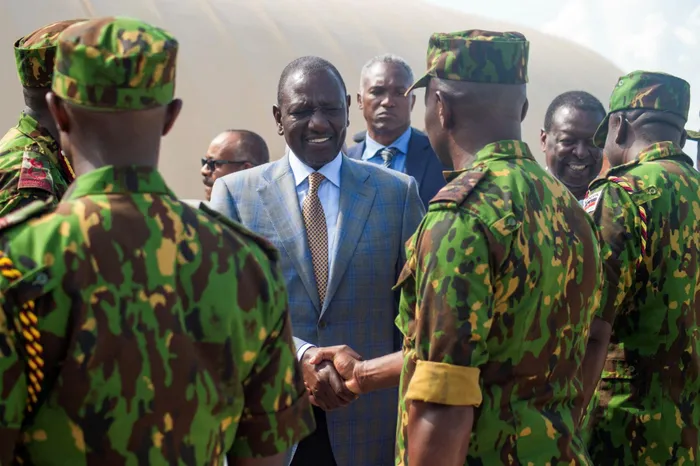Ruto's Haiti Intervention: A Costly Misstep for Kenya

Kenyan President William Ruto is greeted by Kenyan police officers as he arrives at the Toussaint Louverture International Airport in Port-au-Prince, Haiti on September 21, 2024.
Image: AFP
Kim Heller
In mid-2023, the President of Kenya, William Ruto, was rather bullish and bragging as he declared Kenya's entry into the realm of multinational peacekeeping. The President announced that Kenya would be spearheading a vital initiative to restore peace and stability in Haiti, a nation caught in the crippling grip of bloodthirsty gang violence.
Ruto presented this venture not only as a noble humanitarian mission but as a key historical moment for Kenya. The President depicted Kenya as a valiant nation that was willing to help in a treacherous danger zone at a time when most other countries feared such an intervention.
Behind the oratory, the Haiti gambit was self-serving, steered by Ruto's egocentric craving for global stature. The exercise was more about public relations and reputation building than peacekeeping.
The mission of the Multinational Security Support (MSS) mission, led by Kenya, was to provide concrete support to the Haitian National Police in their battle against malevolent gangs terrorising citizens in the capital city of Haiti, Port-au-Prince.
This was the first large-scale international peacekeeping initiative led by an African country. However, there was little significant history in the making. The first delegation of Kenyan forces arrived in Haiti in mid-2024.
Over a year later, things have fallen apart. While the Kenyan-led forces did secure critical national key points such as the Toussaint Louverture airport and major government buildings, they were unable to stop broader-based gang violence and displacement in the capital city. Despite brief periods of respite, humanitarian aid corridors have remained blocked.
The project has failed mainly due to capability and financial shortfalls. The final number of officers deployed was well short of the initial target of 2,500 officers. Kenya contributed close to 1,000 officers.
The failure of the exercise cannot be placed totally at the feet of Ruto. Insufficient funding, vehicles, equipment, and logistical support severely hindered the mission. The MSS operated at 40% capacity.
On 30 September 2025, the United Nations Security Council adopted a resolution for a brand new, more extensive, and better-resourced detachment to take over from the Kenya-led Multinational Security Support mission. The Gang Suppression Force, comprising 5,550 personnel, will be overseen by the United Nations.
Kenya's leadership role in addressing the Haiti crisis has ended, as its continued involvement now falls under the auspices of the United Nations. The movement to a United Nations-led GSF ensures a measure of continuity. It recasts Kenya as an ordinary member of the contingent rather than as the star of the show.
After the announcement of this new UN-coordinated force, the United States has provided twenty new armoured vehicles to assist the initiative.
Even the best-resourced anti-gang brigade cannot deal with the structural fault-lines in Haiti - its political strife, its devastated economy, and societal corrosion. No external force can do the work of a flagging government that has lost control over its security and sovereignty.
Ruto's Haiti gamble was a no-win for Kenya. For a country battling with a poorly functioning economy, rising debt, and inadequate service delivery, the Haiti exercise was misplaced. Financial benefits for quelling gang violence in Haiti failed to materialise in any meaningful way due to inadequate funding mechanisms and commitments.
If Ruto was initially motivated by the prospect of benefitting from the UN-injected funds, this was not to be. International pledges dribbled in far more slowly than anticipated. The U.S. contributed just over $100 million in June 2024, and Kenya close to $3.8 million for operational costs, in early 2025, to try to bridge the funding shortfalls.
While some reimbursements through UN mechanisms and allowances for deployed officers provided nominal financial perks for Kenya, these were minuscule when viewed against the overall costs of the venture and the bottomless pit of operational expenses.
Given Kenya's grave socio-economic situation, one could argue that these funds could have been better placed in job creation or impactful social programmes in Kenya, rather than in the protection of the faraway nation of Haiti.
The allure of global glory led Ruto to prioritise foreign policy over local considerations. What was sold as security diplomacy was nothing more than a brazen move by the head of a state whose own country is rife with problems and has been unsettled by waves of youth discontent and protest.
While Kenya's solidarity with Haiti may appear admirable, a closer examination reveals that it was nothing more than a spectacle of irresponsible leadership. President William Ruto should focus more on restoring Kenya's well-being rather than parading proudly as a pawn of the West and carrying out its dirty work.
Rather than adding a shine of legitimacy to Ruto, the Haiti gamble exposes a shameful neglect of domestic governance. This has become a pattern of Ruto's rule. When the youth of Kenya took to the streets in protest against the Finance Bill, Ruto was enjoying red-carpet VIP treatment in the United States.
Solving the problems in Kenya is no child's play. Ruto's foreign adventuring is no winning game plan. He urgently needs to take responsibility for domestic failings rather than engaging in the game of distraction politics.
If President Ruto does not focus sufficiently on Kenya, resolve its many socio-economic challenges, and deliver on its yearnings for a better tomorrow, his legacy as a failed statesman will be irreparable. In the final analysis, a leader who cannot build peace in his own country has no business trying to fight for peace elsewhere.
* Kim Heller is a political analyst and author of No White Lies: Black Politics and White Power in South Africa.
** The views expressed do not necessarily reflect the views of IOL, Independent Media or The African.